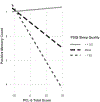Moderating effects of sleep difficulties on relations between posttraumatic stress disorder symptoms and positive memory count
- PMID: 33871878
- PMCID: PMC8405540
- DOI: 10.1002/jclp.23142
Moderating effects of sleep difficulties on relations between posttraumatic stress disorder symptoms and positive memory count
Abstract
Objectives: Posttraumatic stress disorder (PTSD) severity relates to positive memory retrieval difficulties. One variable potentially influencing this relation is sleep difficulties. We examined moderating effects of sleep difficulties (duration and quality) on relations between PTSD severity and count of specific positive memories covarying for age, gender, and depression.
Methods: Participants were an Amazon Mechanical Turk-recruited trauma-exposed community sample of 205 respondents (M age = 35.44; 61.40% women).
Results: Moderated regression analyses indicated significant interaction effects between sleep quality (b = 0.03; p = 0.036) and PTSD severity on specific positive memory count. Among individuals reporting better sleep quality, there were negative associations between PTSD severity and specific positive memory count (b = -0.04, SE = 0.02, p = 0.010). Similar results were obtained for PTSD's intrusion and arousal clusters.
Conclusion: Results support targeting sleep quality and PTSD severity to improve positive memory retrieval in PTSD and memory interventions, and the importance of considering sleep when examining links between PTSD and positive memory retrieval.
Keywords: count of specific positive memories; moderation analyses; posttraumatic stress disorder; sleep; trauma-exposed community sample.
© 2021 Wiley Periodicals LLC.
Conflict of interest statement
Figures


References
-
- Aiken LS, & West SG (1991). Multiple regression: Testing and interpreting interactions. Sage.
-
- American Psychiatric Association. (2013). Diagnostic and Statistical Manual of Mental Disorders (5th ed.). American Psychiatric Association.
Publication types
MeSH terms
Grants and funding
LinkOut - more resources
Full Text Sources
Other Literature Sources
Medical

